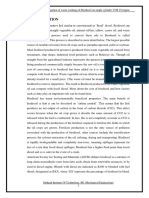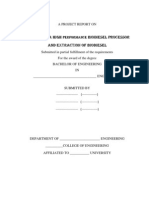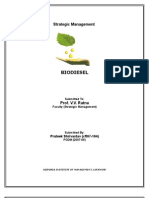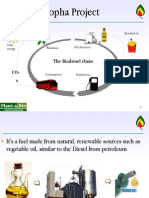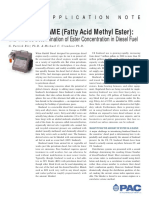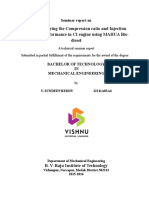0 ratings0% found this document useful (0 votes)
24 viewsSameer Ali 1
Sameer Ali 1
Uploaded by
Sangineni Ravi Teja RGUKT BasarThe document discusses biodiesel as an alternative fuel to address depleting fossil fuel reserves. It defines biodiesel as a fuel similar to conventional diesel that can be produced from vegetable oils, animal fats, or waste cooking oil through a process called transesterification. The document outlines the benefits of biodiesel including reduced emissions, improved engine operation, and providing a renewable fuel source. It also discusses the production of biodiesel, common biodiesel blends with petrodiesel, and concludes by listing references on the topic.
Copyright:
© All Rights Reserved
Available Formats
Download as PPTX, PDF, TXT or read online from Scribd
Sameer Ali 1
Sameer Ali 1
Uploaded by
Sangineni Ravi Teja RGUKT Basar0 ratings0% found this document useful (0 votes)
24 views17 pagesThe document discusses biodiesel as an alternative fuel to address depleting fossil fuel reserves. It defines biodiesel as a fuel similar to conventional diesel that can be produced from vegetable oils, animal fats, or waste cooking oil through a process called transesterification. The document outlines the benefits of biodiesel including reduced emissions, improved engine operation, and providing a renewable fuel source. It also discusses the production of biodiesel, common biodiesel blends with petrodiesel, and concludes by listing references on the topic.
Copyright
© © All Rights Reserved
Available Formats
PPTX, PDF, TXT or read online from Scribd
Share this document
Did you find this document useful?
Is this content inappropriate?
The document discusses biodiesel as an alternative fuel to address depleting fossil fuel reserves. It defines biodiesel as a fuel similar to conventional diesel that can be produced from vegetable oils, animal fats, or waste cooking oil through a process called transesterification. The document outlines the benefits of biodiesel including reduced emissions, improved engine operation, and providing a renewable fuel source. It also discusses the production of biodiesel, common biodiesel blends with petrodiesel, and concludes by listing references on the topic.
Copyright:
© All Rights Reserved
Available Formats
Download as PPTX, PDF, TXT or read online from Scribd
Download as pptx, pdf, or txt
0 ratings0% found this document useful (0 votes)
24 views17 pagesSameer Ali 1
Sameer Ali 1
Uploaded by
Sangineni Ravi Teja RGUKT BasarThe document discusses biodiesel as an alternative fuel to address depleting fossil fuel reserves. It defines biodiesel as a fuel similar to conventional diesel that can be produced from vegetable oils, animal fats, or waste cooking oil through a process called transesterification. The document outlines the benefits of biodiesel including reduced emissions, improved engine operation, and providing a renewable fuel source. It also discusses the production of biodiesel, common biodiesel blends with petrodiesel, and concludes by listing references on the topic.
Copyright:
© All Rights Reserved
Available Formats
Download as PPTX, PDF, TXT or read online from Scribd
Download as pptx, pdf, or txt
You are on page 1of 17
Biodiesel
Name of the student: Shaik Sameer Ali
ID No: B172213
07/09/2021 DEPT. OF CHEMICAL ENGG. RGUKT BASAR 1
Abstract
As the fossil fuels are depleting day by day, there is a need to find
out an alternative fuel to fulfill the energy demand of the world.
Biodiesel is one of the best available sources to fulfill the energy
demand of the world. More than 350 oil-bearing crops identified,
among which some only considered as potential alternative fuels
for diesel engines.
07/09/2021 DEPT. OF CHEMICAL ENGG. RGUKT BASAR 2
Contents
Introduction
What is Biodiesel
Production of Biodiesel
Benefits of Biodiesel use
Biodiesel blends
Reference
07/09/2021 DEPT. OF CHEMICAL ENGG. RGUKT BASAR 3
Introduction :
The petroleum fuels play a very important role in the
development of industrial growth, transportation, agricultural
sector and to meet many other basic human needs. However,
these fuels are limited and depleting day by day as the
consumption is increasing very rapidly. Moreover, their use is
alarming the environmental problems to society.
07/09/2021 DEPT. OF CHEMICAL ENGG. RGUKT BASAR 4
Hence, the scientists are looking for alternative fuels. India is
importing more than 80% of its fuel demand and spending a
huge amount of foreign currency on fuel. Biodiesel is gaining
more and more importance as an attractive fuel due to the
depleting nature of fossil fuel resources.
07/09/2021 DEPT. OF CHEMICAL ENGG. RGUKT BASAR 5
Biodiesel emits fewer pollutants over the whole range of air–fuel ratio
when compared to diesel. Biodiesel can produce by using different
techniques such as ultrasonic cavitation, hydrodynamic cavitation,
microwave irradiation, response surface technology, two-step
reaction process etc.
07/09/2021 DEPT. OF CHEMICAL ENGG. RGUKT BASAR 6
What Is Biodiesel?
Biodiesel is an alternative fuel similar to conventional or ‘fossil’
diesel. Biodiesel can be produced from straight vegetable oil, animal
oil/fats, tallow and waste cooking oil. The process used to convert
these oils to Biodiesel is called transesterification.The largest possible
source of suitable oil comes from oil crops such as rapeseed, palm or
soybean.
07/09/2021 DEPT. OF CHEMICAL ENGG. RGUKT BASAR 7
Production of biodiesel :
Biodiesel is commonly produced by the transesterification of the
vegetable oil or animal fat feedstock, and other non-edible raw
materials such as frying oil, etc. There are several methods for
carrying out this transesterification reaction including the common
batch process, heterogeneous catalysts, supercritical processes,
ultrasonic methods, and even microwave methods.
07/09/2021 DEPT. OF CHEMICAL ENGG. RGUKT BASAR 8
07/09/2021 DEPT. OF CHEMICAL ENGG. RGUKT BASAR 9
Most biodiesel produced at present is produced from waste
vegetable oil sourced from restaurants, chip shops, industrial food
producers. Waste vegetable oil can often be sourced for free or
sourced already treated for a small price. (The waste oil must be
treated before conversion to biodiesel to remove impurities). The
result is Biodiesel produced from waste vegetable oil can compete
with fossil diesel.
07/09/2021 DEPT. OF CHEMICAL ENGG. RGUKT BASAR 10
Benefits of Biodiesel Use :
1. Biodiesel Reduces Greenhouse Gas Emissions.
2. Biodiesel Reduces Tailpipe Emissions.
3. Biodiesel Improves Engine Operation.
4. Reducing the use of fossil fuels.
5. Biodiesel Is Easy to Use.
6. Reducing of atmosphere pollution.
7.renewable source.
Jatropa Biodiesel from DRDO,india
07/09/2021 DEPT. OF CHEMICAL ENGG. RGUKT BASAR 11
07/09/2021 DEPT. OF CHEMICAL ENGG. RGUKT BASAR 12
Biodiesel Blends :
Blends of biodiesel and conventional hydrocarbon-based diesel are
most commonly distributed.factor to state the amount of biodiesel
in any fuel mix:
•100% biodiesel is referred to as B100
•20% biodiesel, 80% petrodiesel is labeled B2
•5% biodiesel, 95% petrodiesel is labeled B5
•2% biodiesel, 98% petrodiesel is labeled B2
07/09/2021 DEPT. OF CHEMICAL ENGG. RGUKT BASAR 13
Blends of 20% biodiesel and lower can be used in diesel equipment with
no, or only minor modifications. Biodiesel can also be used in its pure
form (B100), but may require certainengine modifications to avoid
maintenance and performance problems. Blending B100 with
petroleum diesel may be accomplished by:
07/09/2021 DEPT. OF CHEMICAL ENGG. RGUKT BASAR 14
1.Mixing in tanks at manufacturing point prior to delivery to tanker truck
2. Splash mixing in the tanker truck (adding specific percentages of biodiesel
and petroleum diesel)
3. In-line mixing, two components arrive at tanker truck simultaneously.
4. Metered pump mixing, petroleum diesel and biodiesel meters are set to X
total volume.
07/09/2021 DEPT. OF CHEMICAL ENGG. RGUKT BASAR 15
Reference
1.U.S. department of energy : Biodiesel handling and use guide (5th edition)-2016
2. Tabatabaei, Meisam, Aghbashlo, Mortaza : Biodiesel: From Production to Combustion-
2018
3. Rafael luque and juan A.melero :Advances in Biodiesel Production: Processes and
Technologies-2012
4. Ahn E, Koncar M, Mittelbach M, Man R. A low-waste process for the production of
biodiesel. Separation Science and Technology- 1995
5. Cvengro J, Povaz AF. Production and treatment of rapeseed oil methyl estersas
alternative fuels for diesel engines. Bioresource Technology- 1996.
6. www.sciencedirect.com
07/09/2021 DEPT. OF CHEMICAL ENGG. RGUKT BASAR 16
Thank you
07/09/2021 DEPT. OF CHEMICAL ENGG. RGUKT BASAR 17
You might also like
- The Compound Effect - NotesDocument3 pagesThe Compound Effect - NotesJason Cruz100% (9)
- A Project Report On Biodiesel ProductionDocument74 pagesA Project Report On Biodiesel ProductionShwet Kumar100% (1)
- Understanding Biodiesel Technologies From Concept To Clarity PDFDocument21 pagesUnderstanding Biodiesel Technologies From Concept To Clarity PDFKP100% (1)
- The Technical Manual For: Waste SystemsDocument40 pagesThe Technical Manual For: Waste SystemsPablo Julio Santa-Cruz RoldánNo ratings yet
- Sl. No. Description of Work Unit Qty. Rate Amount Rate Amount Total Amount Rs. Rs. Rs. Rs. Rs. I Option-1Document12 pagesSl. No. Description of Work Unit Qty. Rate Amount Rate Amount Total Amount Rs. Rs. Rs. Rs. Rs. I Option-1mdalt9180100% (2)
- Applications of BiofuelsDocument21 pagesApplications of BiofuelsSatish HSNo ratings yet
- Experimental Investigation of Waste Cooking Oil Biodiesel On Single Cylinder VCR CI EngineDocument18 pagesExperimental Investigation of Waste Cooking Oil Biodiesel On Single Cylinder VCR CI EnginePrashant MurgeNo ratings yet
- Experimental Investigation On The Influence of Palm Oil Biodiesel in A Diesel EngineDocument9 pagesExperimental Investigation On The Influence of Palm Oil Biodiesel in A Diesel EngineEditor IJTSRDNo ratings yet
- "Application of Biofuels in Automotives ": Visveswaraiah Technological University, BelgaumDocument23 pages"Application of Biofuels in Automotives ": Visveswaraiah Technological University, BelgaumharimadhavareddyNo ratings yet
- Biodiesel PaperDocument5 pagesBiodiesel PaperemmaNo ratings yet
- Bio Diesel Book - Dr. Satish LeleDocument339 pagesBio Diesel Book - Dr. Satish LeleNakul Chandak100% (3)
- Green Chemistry - BiodieselDocument21 pagesGreen Chemistry - Biodieselkavikumar venkatajalamNo ratings yet
- The BiodeiselDocument107 pagesThe Biodeiselabdisahurisa24No ratings yet
- Biodiesel: Submitted byDocument17 pagesBiodiesel: Submitted bysai mohan100% (1)
- Biodiesel ReportDocument26 pagesBiodiesel ReportItsura AnnetteNo ratings yet
- A Project Report On Biodiesel ProductionDocument73 pagesA Project Report On Biodiesel ProductionAllprojects Guru80% (10)
- Ijaar Ste v4n6 Jun18 p46Document8 pagesIjaar Ste v4n6 Jun18 p4621DME26 Ravikant KumarNo ratings yet
- Renewable and Sustainable Energy ReviewsDocument9 pagesRenewable and Sustainable Energy ReviewsAndreea MadalinaNo ratings yet
- Bio Disel 19Document67 pagesBio Disel 19Vilay BhatiNo ratings yet
- Project ReportDocument54 pagesProject Reportjadhavakshay610No ratings yet
- Report On BiodieselDocument32 pagesReport On BiodieselEmmanuelNo ratings yet
- BiodieselDocument17 pagesBiodieselSasa AtefNo ratings yet
- Extracted Biodiesel As Feed For Internal Combustion EngineDocument8 pagesExtracted Biodiesel As Feed For Internal Combustion Enginekt rajaNo ratings yet
- Biodiesel Feasibility Study by RicCapistranoDocument17 pagesBiodiesel Feasibility Study by RicCapistranobiodieselchemistdawNo ratings yet
- BiodieselDocument23 pagesBiodieselswayam chandanNo ratings yet
- Synthesis and Assessment of Physicochemical Attributes of Biodiesel Obtained From Cottonseed (Gossypium Arboretum L.) OilDocument8 pagesSynthesis and Assessment of Physicochemical Attributes of Biodiesel Obtained From Cottonseed (Gossypium Arboretum L.) OilInternational Journal of Innovative Science and Research TechnologyNo ratings yet
- Development of BiodieselsDocument9 pagesDevelopment of BiodieselsARJYA ROYNo ratings yet
- Thesis Statement For BiodieselDocument8 pagesThesis Statement For Biodieselkualxkiig100% (2)
- 2 67 1628503050 2ijmperdoct20212Document22 pages2 67 1628503050 2ijmperdoct20212TJPRC PublicationsNo ratings yet
- Synthesis Paper Title: BiofuelsDocument24 pagesSynthesis Paper Title: Biofuelspati_deeps234No ratings yet
- 1.1 Applications of BiodieselDocument14 pages1.1 Applications of BiodieselTabrez AlamNo ratings yet
- AlgaeDocument29 pagesAlgaeNicholas SheltonNo ratings yet
- Exploitation of Oil-Bearing Microalgae For BiodieselDocument10 pagesExploitation of Oil-Bearing Microalgae For BiodieselJeevan KumarNo ratings yet
- A Business Plan For A Biodiesel CompanyDocument13 pagesA Business Plan For A Biodiesel CompanyprakashNo ratings yet
- 1827 ApprovedpaperDocument20 pages1827 ApprovedpaperMahtab SajnaniNo ratings yet
- Article PublicationDocument8 pagesArticle Publicationrikaseo rikaNo ratings yet
- Biofuel and BiodieselDocument16 pagesBiofuel and Biodieseljoe100% (3)
- Optimized Conditions For The Design and Operation of A Vacuum Distillation ColumnDocument18 pagesOptimized Conditions For The Design and Operation of A Vacuum Distillation Columnhamz9k1No ratings yet
- 1 s2.0 S266682112200045X MainDocument31 pages1 s2.0 S266682112200045X MainIrfani Mauludiyah FitriNo ratings yet
- Chemistry Investigatory ProjectDocument18 pagesChemistry Investigatory ProjectSubhikshaNo ratings yet
- What Is Biodiesel?Document6 pagesWhat Is Biodiesel?Sandra GilbertNo ratings yet
- My Chemistry Project PDFDocument11 pagesMy Chemistry Project PDFHari VNo ratings yet
- Backyard Biodiesel Risk Potter August 2010Document20 pagesBackyard Biodiesel Risk Potter August 2010jorgebwongNo ratings yet
- Linza Bio DieselDocument17 pagesLinza Bio Dieselsphamandla mwelaseNo ratings yet
- Projeto Biodiesel JatrophaDocument48 pagesProjeto Biodiesel Jatrophalcardoso100% (17)
- Paper 6 - IJERA 2013Document11 pagesPaper 6 - IJERA 2013KrishnaMurthyTPNo ratings yet
- BiodieselDocument15 pagesBiodieselGanesh PulavaleNo ratings yet
- (Advantages of BiodieselDocument5 pages(Advantages of BiodieselYoussef KamounNo ratings yet
- ImpacDocument5 pagesImpacYoussef KamounNo ratings yet
- The Use of Nonconventional Fuels To Internal Combustion EnginesDocument10 pagesThe Use of Nonconventional Fuels To Internal Combustion EnginesshyleshaNo ratings yet
- The Behaviour of A Compression Ignition Engine Under The Influence of Diesel and Microalgae Biodiesel BlendsDocument10 pagesThe Behaviour of A Compression Ignition Engine Under The Influence of Diesel and Microalgae Biodiesel BlendsTJPRC PublicationsNo ratings yet
- Plogarithm Edited Report 1 NowDocument44 pagesPlogarithm Edited Report 1 NowSrinivasa bnNo ratings yet
- 1.1 Background: "Optimization of Synthesis of Biodiesel Using Membrane"Document5 pages1.1 Background: "Optimization of Synthesis of Biodiesel Using Membrane"Ganesh ShindeNo ratings yet
- Biodiesel As An Alternative Fuel For Direct Injection Diesel Engines: A ReviewDocument18 pagesBiodiesel As An Alternative Fuel For Direct Injection Diesel Engines: A Reviewmert tıglıNo ratings yet
- Application Note CETANE 2000Document2 pagesApplication Note CETANE 2000Aline GonçalvesNo ratings yet
- Different Techniques For The Production of Biodiesel From Waste Vegetable OilDocument31 pagesDifferent Techniques For The Production of Biodiesel From Waste Vegetable OilShreyank Deepali GoelNo ratings yet
- Biodiesel Production - A Mini Review PDFDocument13 pagesBiodiesel Production - A Mini Review PDFyohannes100% (1)
- Diesel OilDocument22 pagesDiesel OilTRISHA NICOLE YU GERMANESNo ratings yet
- Biofuel: A Promising Alternative Renewable Energy ResourceDocument5 pagesBiofuel: A Promising Alternative Renewable Energy Resourcesanojk_2000No ratings yet
- The Advances and Limitations in Biodiesel Production: Feedstocks, Oil Extraction Methods, Production, and Environmental Life Cycle AssessmentDocument21 pagesThe Advances and Limitations in Biodiesel Production: Feedstocks, Oil Extraction Methods, Production, and Environmental Life Cycle AssessmentMarkNo ratings yet
- Seminar ReportDocument29 pagesSeminar Reportv sundeep Reddy80% (5)
- Biodiesel Production101: Homebrew Edition: A Do It Yourself Guide to Produce Biodiesel on Your BackyardFrom EverandBiodiesel Production101: Homebrew Edition: A Do It Yourself Guide to Produce Biodiesel on Your BackyardNo ratings yet
- Advances in Biofeedstocks and Biofuels, Volume 2: Production Technologies for BiofuelsFrom EverandAdvances in Biofeedstocks and Biofuels, Volume 2: Production Technologies for BiofuelsLalit Kumar SinghNo ratings yet
- Atum Capital Offer LetterDocument3 pagesAtum Capital Offer Lettermamatha vemulaNo ratings yet
- Alfonso, Moses Jamel M.Document4 pagesAlfonso, Moses Jamel M.Paul Vincent LauretaNo ratings yet
- Bullish Hammer Formula For Daily Timeframe, Technical Analysis ScannerDocument2 pagesBullish Hammer Formula For Daily Timeframe, Technical Analysis Scanneryashs12238No ratings yet
- Iap Feb IssueDocument86 pagesIap Feb IssueDhanya PillaiNo ratings yet
- VOCABDocument3 pagesVOCABPermata SariNo ratings yet
- How To Check A Capacitor With Digital Multimeter and Analog AVO Meter. by Four (5) Methods With Pictorial ViewDocument7 pagesHow To Check A Capacitor With Digital Multimeter and Analog AVO Meter. by Four (5) Methods With Pictorial ViewDivagar PNo ratings yet
- Accomplishment Report LavatoryDocument5 pagesAccomplishment Report LavatoryRHODALYN REYESNo ratings yet
- National Electrical Code (2017) - GroundingDocument29 pagesNational Electrical Code (2017) - Groundingpurit83No ratings yet
- Harvard SampleDocument12 pagesHarvard Samplesally omukoNo ratings yet
- BBC News - Ask The Sexpert - The 90-Year-Old Sex GuruDocument6 pagesBBC News - Ask The Sexpert - The 90-Year-Old Sex GuruviketjhaNo ratings yet
- Stp998-Eb 2198Document151 pagesStp998-Eb 2198Rafaela Ribeiro de OliveiraNo ratings yet
- 100 PPM Implementation ProcessDocument7 pages100 PPM Implementation Processnataraj_s64488No ratings yet
- Labor Law MidtermsDocument5 pagesLabor Law MidtermsDoan BalboaNo ratings yet
- Design of DrainDocument1 pageDesign of DrainNavarun VashisthNo ratings yet
- OB Reflection PaperDocument3 pagesOB Reflection Paperbarnab91100% (2)
- Catalog Mesoject GunaDocument18 pagesCatalog Mesoject GunaRoxana BalaceanuNo ratings yet
- Abdominal Four Quadrants: Abdominal Nine Divisions (A) and Quadrant Regions (B) : The Abdomen IsDocument4 pagesAbdominal Four Quadrants: Abdominal Nine Divisions (A) and Quadrant Regions (B) : The Abdomen IsLalajimNo ratings yet
- Furn Svb10a enDocument9 pagesFurn Svb10a enapi-279886039No ratings yet
- h30 EdanDocument2 pagesh30 Edanamor kermaya0% (1)
- Steel Slag As A Road Construction MaterialDocument6 pagesSteel Slag As A Road Construction MaterialBinay DhakalNo ratings yet
- Geography Taiga and TundraDocument19 pagesGeography Taiga and TundraAthvik ChandrasegaranNo ratings yet
- Sreekumar and Nizar Banu, 2022Document11 pagesSreekumar and Nizar Banu, 2022yashvardhhanNo ratings yet
- Catálogo Industrial EnglishDocument77 pagesCatálogo Industrial EnglishRomildo FernandesNo ratings yet
- Coca-Cola - Case.study For CSR B.Ethics Final PaperDocument9 pagesCoca-Cola - Case.study For CSR B.Ethics Final PaperZohaib AhmadNo ratings yet
- Condo Mango VarietiesDocument3 pagesCondo Mango VarietiesBerns ReyesNo ratings yet
- M.arch. Fibre Reinforced ConcreteDocument18 pagesM.arch. Fibre Reinforced ConcreteSaloniNo ratings yet
- 1 - Heat TreatmentDocument61 pages1 - Heat TreatmentMohamed Karim MohamedNo ratings yet






